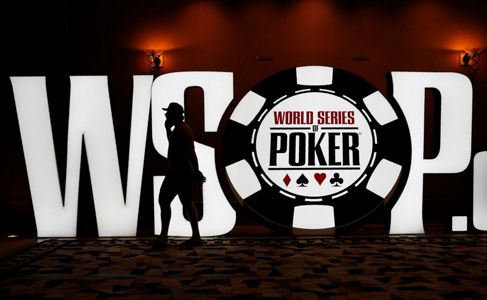Tens of thousands of professional and amateur poker players go on a pilgrimage to Las Vegas every summer in hopes of returning home richer, owning a gold bracelet and having considerable bragging rights.
They are young and old and overwhelmingly male. They are college dropouts and accountants, entrepreneurs and CEOs, actors and athletes, psychologists and comedians. And they all have a chance of becoming world champions.
At the World Series of Poker — now marking its 50th edition — everything is possible.
"The beauty of poker is anyone can enter and anyone can win," said Ty Stewart, the series' executive director. "We all love the stories of overcoming challenges, at defying the odds. This occurs regularly at the World Series of Poker."
Cowboy gambler Benny Binion probably wouldn't recognize the tournament today. He started it in 1970 as an invitation-only event with a few men gathered at his casino in downtown Las Vegas. They were all elite players, and Johnny Moss was declared the winner by the other men at the table.
Moss got a trophy. There was no multimillion-dollar prize pool, no constant television coverage and definitely no smoking ban.
It has transformed into a phenomenon that has paid almost $3 billion in prizes — minting millionaires, airing live on ESPN and streaming online.
The series is well positioned to set an attendance record this year, with 122,473 entries so far. Its marquee contest, the $10,000 buy-in no-limit Texas Hold 'em main event, kicks off Wednesday. The no-limit betting rules mean players can wager all their chips at any time.
The tournament this year runs through July 16 at the Rio All-Suite Hotel and Casino, off the Las Vegas Strip. It features different poker variations, with buy-ins for the events ranging from $400 to $100,000.
The series saw a record 123,865 contestants in 2018, when the prize pool of over $266 million was divided among 18,105 participants. Twenty-eight of them earned at least $1 million. Every champion received a gold bracelet under a tradition started in 1976.
"When we started out, there were very few people from outside the United States that were playing with us," said T.J. Cloutier, 79, a six-time bracelet winner from Richardson, Texas. "And now there's a ton of people, and they are from all over."
More than 100 countries were represented in last year's tournament.
Poker's popularity in the U.S. erupted in 2003, when Tennessee accountant Chris Moneymaker entered a $39 online poker satellite contest, won an entry to the main event and emerged victorious, earning $2.5 million and inspiring other amateur players. Many had been honing their skills — and building a bankroll — through online games.
A year earlier, so-called hole-card cameras were introduced to the series' broadcasts, allowing viewers to see the cards participants were holding and play armchair quarterback.
"When you watched it on TV, it was like watching paint dry," said Cloutier, who has finished the main event twice as runner-up and once each in third and fifth place. "Now, you could actually watch the tournament and know what was going on."
Entries to the 2004 tournament increased by 85%. By 2006, the main event got a record number of players. But then poker began to lose steam in the U.S.
Participants in the series' main event fell by 28% in 2007, when the government cracked down on online wagers. The Department of Justice in April 2011 then delivered a stronger blow when it seized the domain names of the largest offshore poker sites catering to U.S. customers.
While participation in the series has set records since 2013, the main event has remained below the 2006 record. The overall increase is tied to the addition of events with smaller buy-ins.
"There are events for a wider group of people," poker pro Daniel Negreanu said. "What that does is it attracts a much wider skill set of players. You have your hometown hero who comes out to Las Vegas to give it a shot as well as, of course, all the top professionals in the world."
Series owner Caesars Interactive Entertainment is holding an awards ceremony Saturday to celebrate the 50th milestone. The company allowed fans to choose some players being recognized, including fan favorite player, the series' "favorite bad boy" and the four most important players in the tournament's history.
A panel of media and industry experts also revealed this week a list of the 50 greatest poker players in history, including Cloutier and Negreanu.
Jacksonville Jaguars defensive lineman Calais Campbell and record-setting Jeopardy contestant James Holzhauer are celebrities who have played this year. Other contestants could become famous overnight.
Many of those who remember watching Moneymaker's storybook victory as teenagers and the ensuing poker boom are now competing and winning.
"I played all throughout middle school, even as a kid. I was always a big fan, and the personalities in the game were kind of what made it great," said Scott Blumstein, who won $8.1 million as a 25-year-old in 2017's main event. "As a kid, I used to definitely look up to these people, and it's really cool being a part of it now because I definitely watched it and was a fan."
___
Garcia Cano reported from Baltimore. Follow her on Twitter at https://twitter.com/reginagarciakNO .
Copyright 2019 The Associated Press. All rights reserved. This material may not be published, broadcast, rewritten or redistributed.









